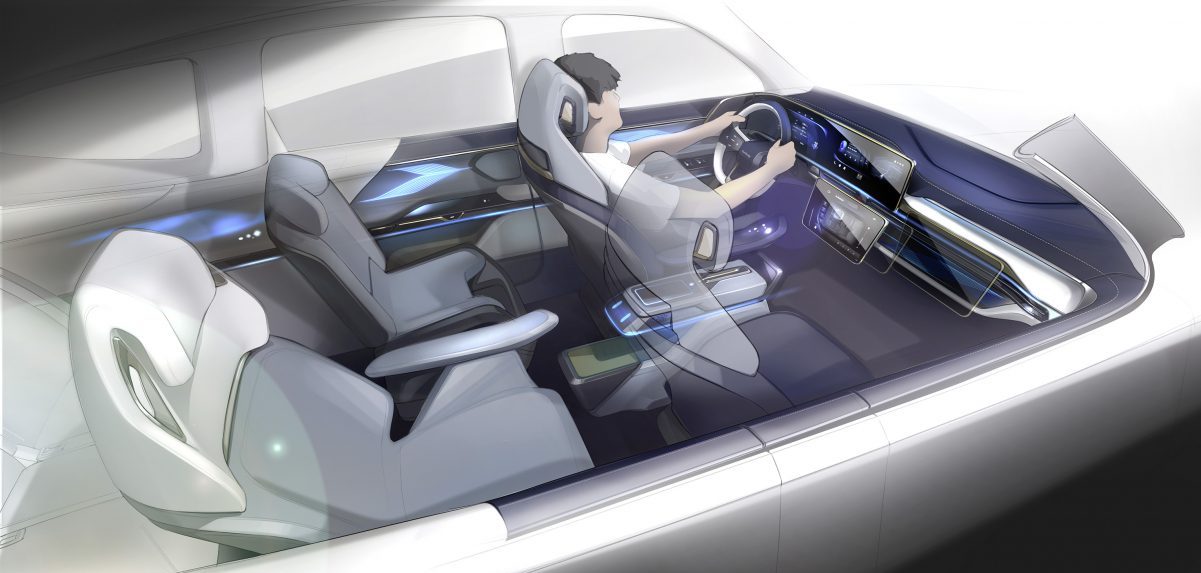
Smart Vehicle Cabin Market: Introduction
- The automobile cabin has witnessed significant transformation over the last few years to become more human centric in order to offer better safety, comfort, and ride experience. These new vehicle cabins with smart surfaces, multi-modal inputs, wireless connectivity, and a wide array of functionalities are termed as smart cabins or intelligent cabins.
- Smart vehicle cabins utilize an array of advanced sensors, interactive human machine interface (HMI), and specially engineered materials to better analyze the behavior of vehicle occupants, their requirements, and surroundings to adjust the dynamics of vehicle cabin such as temperature, speaker volume, radio station, and lighting. These multiple benefits of smart vehicle cabins along with increased safety is further fueling their demand.
Key Drivers of Smart Vehicle Cabin Market
- Demand for next-generation vehicles is increasing due to a rise in the purchasing power of consumers. Consequently, changing demands of consumers is prompting OEMs to incorporate advanced systems in their vehicles, which render different levels of autonomy and increase convenience of driver and passengers. Vehicle cabin is at the core of this transformation and hence, witnessing high integration of intelligent technologies that enhance the safety and ride experience. For instance, Daimler AG’s MBUX Interior Assistant uses an artificial intelligence-based gesture input system to enhance the interaction of vehicle occupants with the vehicle. This integration of advanced technologies coupled with growing popularity of next-generation vehicles is driving the smart vehicle cabin market across the globe.
- Rise in number of on-road vehicles has resulted in high number of road traffic accidents, thus creating awareness about driver and passenger safety. National Highway Traffic Safety Administration stated that in 2017, 6.5 million road-traffic accident were reported across the U. S. Majority of these accidents are caused due to driver distraction, which in turn is fueling the requirement for efficient in-cabin monitoring systems such as vital signs monitoring, life presence detection, passenger classification. The European Union has mandated installation of in-cabin driver monitoring solutions in all cars sold across Europe from 2024. Thus, growing awareness about vehicle safety and regulatory transformations relevant to it are fueling the global smart vehicle cabin market.
Planning to lay down future strategy? Perfect your plan with our report sample here https://www.transparencymarketresearch.com/sample/sample.php?flag=S&rep_id=82009

Challenges in Smart Vehicle Cabin Market
- Smart vehicle cabins are powered by various connectivity technologies that makes them highly vulnerable to cyber-attacks and pose a threat to data privacy of users, thereby hampering the global smart vehicle cabin market. Furthermore, these systems increase the overall cost of vehicles, which restricts their application to luxury vehicles.
Impact of COVID-19 pandemic on Smart Vehicle Cabin Market
- Decline in production and sales of vehicles due to the COVID-19 pandemic led to a decline in demand for smart vehicle cabin. However, in the post-COVID phase, these solutions are expected to witness high demand owing to their possible applications for filtering cabin air, monitoring the vitals of vehicle occupants, and providing touchless access to various in-cabin systems.
North America and Europe hold significant share of Global Smart Vehicle Cabin Market
- North America and Europe account for a significant share of the global smart vehicle cabin market, as OEMs including Daimler AG, BMW AG, and Tesla are continuously developing next-generation vehicles that are equipped with smart cabin technologies. Furthermore, the purchasing power of populations in North America and Europe is fueling the demand for vehicles equipped with smart cabin, thereby propelling their share in the global smart vehicle cabin market.
Key Players Operating in Smart Vehicle Cabin Market
The smart vehicle cabin market is highly concentrated due to the presence of top manufacturers. A few of the key players operating in the smart vehicle cabin market are:
- Analog Devices, Inc.
- BlackBerry Limited
- HYUNDAI MOBIS
- Panasonic Corporation
- SenseTime
- Texas Instruments Incorporated
- Valeo
- Xilinx
- Xperi Corporation
- Yanfeng Automotive Interiors
Global Smart Vehicle Cabin Market: Research Scope
Global Smart Vehicle Cabin Market, by Application
- Cabin conditioning
- In-cabin monitoring
- Infotainment
- Wireless Connectivity
- Haptic HMI
- Others
Global Smart Vehicle Cabin Market, by Component/System
- Display
- HVAC
- Speakers
- Lighting
- Sensors
- Others
Global Smart Vehicle Cabin Market, by Vehicle Type
- Passenger Vehicle
- Hatchback
- Sedan
- Utility Vehicle
- Light Commercial Vehicle
- Buses & Coaches
- Trucks
Global Smart Vehicle Cabin Market, by Propulsion
- I.C Engine Vehicle
- Gasoline Vehicle
- Diesel Vehicle
- Electric Vehicle
- Battery Electric Vehicle (BEV)
- Hybrid Electric Vehicle (HEV)
- Plug-in Hybrid Electric Vehicle (PHEV)
Global Smart Vehicle Cabin Market, by Sales Channel
- Aftermarket
- OEM
Global Smart Vehicle Cabin Market, by Region
- North America
- U.S.
- Canada
- Europe
- Germany
- France
- U.K.
- Italy
- Spain
- Nordic Region
- Rest of Europe
- Asia Pacific
- China
- Japan
- India
- ASEAN
- Rest of Asia Pacific
- Latin America
- Brazil
- Mexico
- Rest of Latin America
- Middle East & Africa
- GCC
- South Africa
- Rest of Middle East & Africa
Looking for exclusive market insights from business experts? Buy Now Report here https://www.transparencymarketresearch.com/checkout.php?rep_id=82009<ype=S
This study by TMR is all-encompassing framework of the dynamics of the market. It mainly comprises critical assessment of consumers’ or customers’ journeys, current and emerging avenues, and strategic framework to enable CXOs take effective decisions.
Our key underpinning is the 4-Quadrant Framework EIRS that offers detailed visualization of four elements:
- Customer Experience Maps
- Insights and Tools based on data-driven research
- Actionable Results to meet all the business priorities
- Strategic Frameworks to boost the growth journey
The study strives to evaluate the current and future growth prospects, untapped avenues, factors shaping their revenue potential, and demand and consumption patterns in the global market by breaking it into region-wise assessment.
The following regional segments are covered comprehensively:
- North America
- Asia Pacific
- Europe
- Latin America
- The Middle East and Africa
The EIRS quadrant framework in the report sums up our wide spectrum of data-driven research and advisory for CXOs to help them make better decisions for their businesses and stay as leaders.





